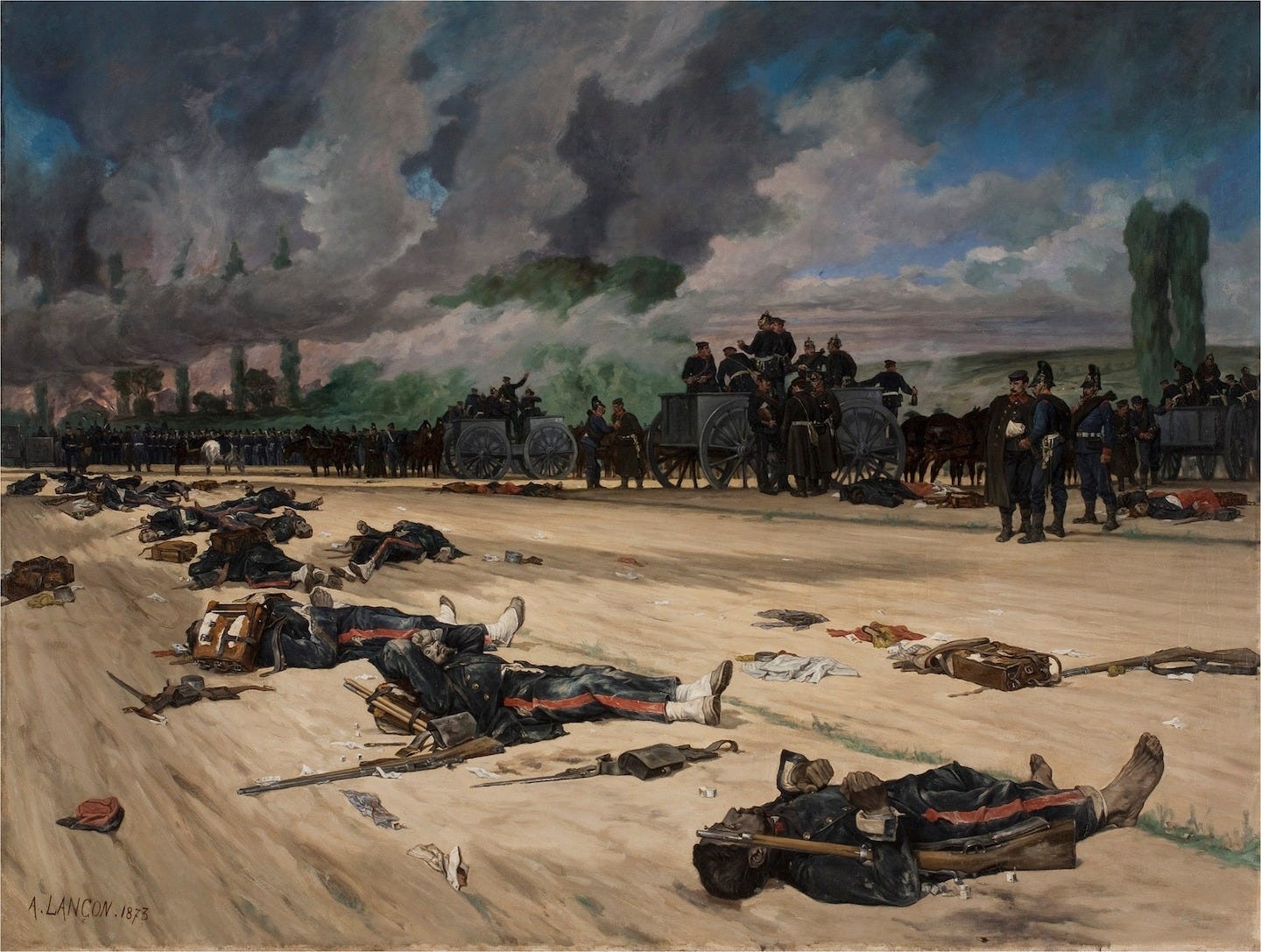
The Silent Slain
by Archibald MacLeish
for Kenneth MacLeish, 1894–1918 We too, we too, descending once again The hills of our own land, we too have heard Far off — Ah, que ce cor a longue haleine — ◦ Ah, how long this horn has blown The horn of Roland in the passages of Spain, The first, the second blast, the failing third, And with the third turned back and climbed once more The steep road southward, and heard faint the sound Of swords, of horses, the disastrous war, And crossed the dark defile at last, and found At Roncevaux upon the darkening plain The dead against the dead and on the silent ground The silent slain — ═════════════════════════
Archibald MacLeish (1892–1982), born on May 7, included Today’s Poem in his 1926 collection Streets in the Moon. And it’s worth considering, here on Memorial Day, if only because the poem is somehow both deeply personal and entirely literary, an abstract gesture toward Song of Roland — an eleventh-century French epic narrative: the most famous, the longest-enduring, the most nation-defining of the medieval chansons de geste.
The 12-line single-stanza war poem, rhymed abaabcdcdadc, is mostly pentameter — although, strictly construed, lines 4 and 11 have six stresses, while line 12 has two, and line 8 gets to five only by stressing “the” to avoid three unstressed syllables in a row. All of which suggests that MacLeish, living in France is building toward a vers libre construction, with rhymed lines of no determined metrical structure.
MacLeish had been in the First World War, first as an ambulance driver and then as an artillery officer, present at the Second Battle of the Marne. He returned to the United States to finish law school, but within he few years he fled back to Europe, spending the rest of the 1920s in Paris. His return to America would see a meteoric rise through the mandarin world of public intellectualism, serving as Librarian of Congress and a Harvard professor. His best-known poems are probably the 1930 “You, Andrew Marvell” and the 1926 “Ars Poetica,” which shouldn’t be that surprising. Though he wrote relentlessly until his death, his best poetry came during his Paris days.
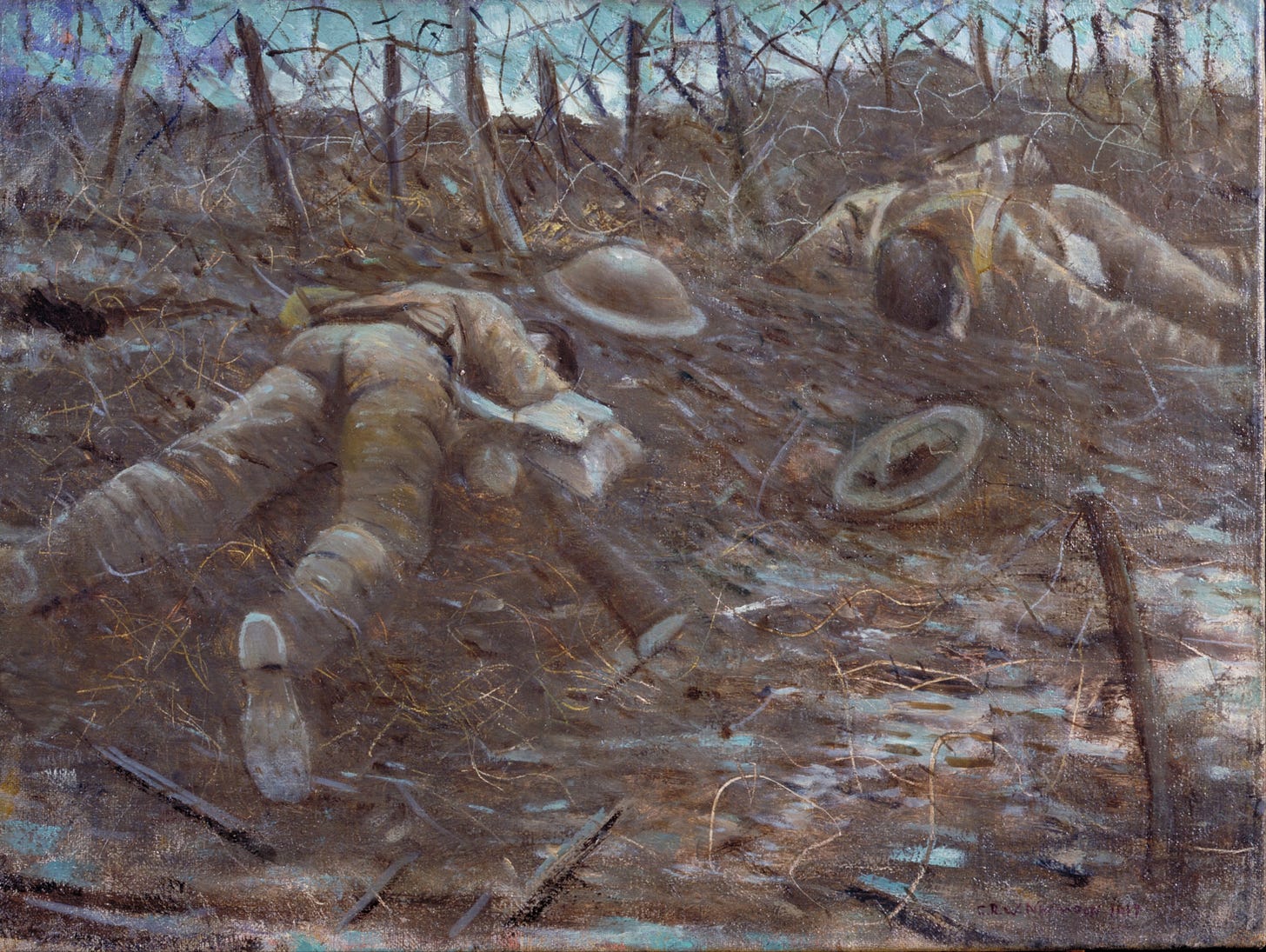
When “The Silent Slain” was first published he gave it the title “The Too-Late Born,” which limited interpretation in interesting ways — likening the people who discover the battlefield aftermath to those who were born too late to fight: a kind of regret, a post-slaughter guilt, of survivors old enough to know of some particular war but too young to have fought. He would later change the title to “The Silent Slain” and add the dedication “for Kenneth MacLeish, 1894–1918,” which narrowed the poem to World War I and yet simultaneously expanded it, making the poem much more universal: the guilt, the horror, of any soldier who comes upon his countrymen dead in battle, too late to have fought with them.
That is, of course, a story told in Song of Roland. In A.D. 778, Roland was sent with the flower of French nobility to hold a pass through the Pyrenees at Roncevaux, acting as a rearguard to prevent attacks on the French as the army returned from Spain. Charlemagne gave him a horn to blow if an attack proved too strong for his small force, but Roland refused to blow it and summon the main army until his final breaths, and Charlemagne’s forces returned to find the nobleman and all his men dead upon the field.
Ah, que ce cor a longue haleine: “Ah, how long this horn has breath [i.e. has been blowing].” That line has long perdured (quoted in The Sun Also Rises, for example). Roland himself is recurring figure in Western literature, from Ariosto’s 1516 Orlando Furioso to Browning’s 1855 “Childe Roland to the Dark Tower Came” (which is hard to relate to the French original, born instead from the nonsense “Child Rowland to the dark tower came. / His word was still “Fie, foh, and fum, / I smell the blood of a British man” in King Lear 3.4). But the song’s central corpse-littered scene of Roncevaux is what MacLeish takes as his image: “We too, we too.” Like the French, the poet has seen soldiers arrayed where they fell — and at Roncevaux, found “The dead against the dead and on the silent ground / The silent slain.”
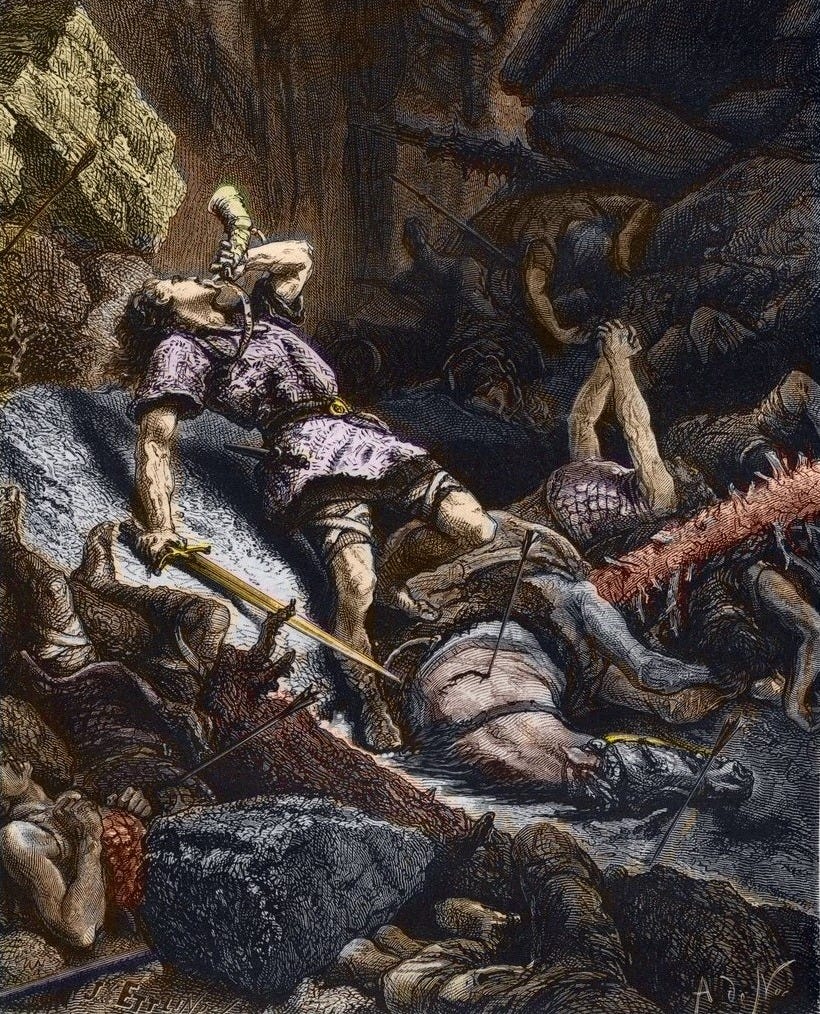




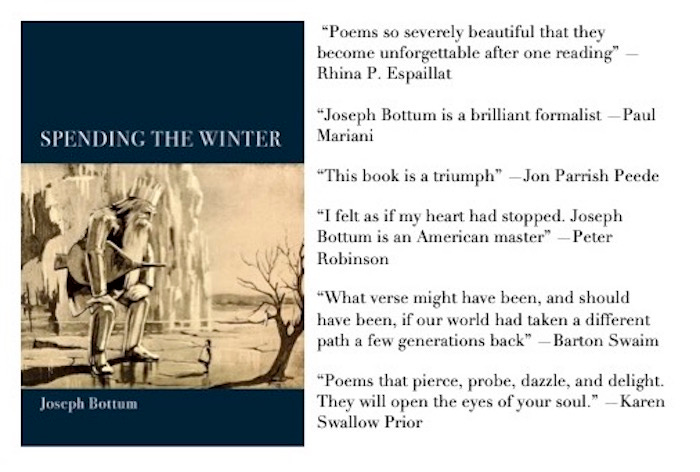
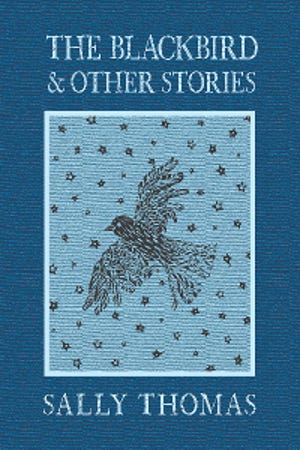
Thank you so much. One thing you do not note about this extraordinary man was his role in founding UNESCO, which included his penning that immortal line, now (in revised form) its motto: Since wars begin in the minds of men, it is in the minds of men that the defenses of peace must be constructed.
I beg to differ that this poem is "building toward a vers libre construction", Jody: it is robustly metered!
The two hexameters are logically placed (both concluding a third rhyme. The "Spain" rhyme on line 4 is the 3rd of five; the remaining two surround the hexameter on the penultimate line, closing on the dimeter).
And line 8...
"Of swords, of horses, the disastrous war,"
...is what I call a "balanced line": a light middle beat is rhythmically demoted to secondary status, leaving two primary beats either side in a syncopated 4-beat rhythm. You can see it employed, for instance, by King Richard, angrily resigning himself to his fate, comparing what he must forego to what he avows to take up in their place:
"I'll give my jewels for a set of beads,
My gorgeous palace for a hermitage,
My gay apparel for an almsman's gown,
My figured goblets for a dish of wood,"
In MacLeish's line, the sounds "Of swords, of horses" are balanced with what they represent: "the disastrous war".
I can see why that line struck you as unusual: it *is* unusual for the middle light beat, when it's a monosyllabic word, to be an article as opposed to a connecting word (a conjunction or preposition). But it's perfectly metrical.
The hexameters, too, provide a superb sense of balance.
"The dead against the dead and on the silent ground", with its even number of beats, and the conjunction landing straight after the 3rd beat, has a robust symmetry. The two halves are then tied together by the final dimeter, "The silent slain", which both echoes "the silent ground" and, in its consonance, "dead...dead" (while "slain" simultaneously echoes "against").
The extra beat in "The horn of Roland in the passages of Spain", meanwhile, provides the capaciousness to convey the robust sound of the horn rolling out through Spain's "passages", with its initial tightly spaced pair of long, drawn out beats falling into two successive slides of three light syllables running into a matching pair of primary consonating beats (di-*di*-di-DUM-di-*di*-di-DUM): "the HORN of ROland *in* the PAssa*ges* of SPAIN" (and at the word level, the long roll out of "PAssages" builds beautifully on the initial fall of "ROland").
I've discussed light beats with Sally, also: https://substack.com/@snapdragons/note/c-117921072?utm_source=notes-share-action&r=9w4rx. Juliet's line, "my BOUNty is as BOUNdless as the SEA", in contrast to the balanced line, has light, demoted beats *either side* of the central beat, which enhances the default enlarged (or dipodic) 3-beat rhythm of the iambic pentameter. I call this the "golden line".
That the rhythms of iambic pentameter can vary so easily (depending on the placement of light beats, of caesuras, and of the use of enjambment) is what makes the meter so wonderfully subtle, flexible, and expressive, which should be fully embraced, in my opinion!